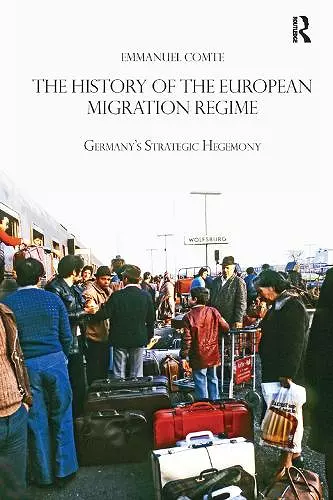The History of the European Migration Regime
Germany's Strategic Hegemony
Format:Paperback
Publisher:Taylor & Francis Ltd
Published:5th Jul '19
Currently unavailable, and unfortunately no date known when it will be back
This paperback is available in another edition too:
- Hardback£145.00(9781138060524)

After the Second World War, the international migration regime in Europe took a course different from the global migration regime and the migration regimes in other regions of the world. From the bureaucratic and restrictive practices that prevailed in the late 1940s in most parts of Europe, the European migration regime was deeply transformed by the gradual implementation of the free movement of people within the European Community, of European citizenship, and of the Schengen agreements in their internal and external dimensions. They have produced a regional regime in Europe with an unparalleled degree of intra-regional openness and an unparalleled degree of closure towards migrants from outside Europe. On the basis of relevant national and international archives, this book explains how German geopolitical and geo-economic strategies during the Cold War shaped the openness of that original regime. The History of the European Migration Regime highlights how the regime was instrumental for Germany to create a stable international order in Western Europe after the war, conducive to German reunification, the rollback of Russian influence from Central Europe, and German economic expansion. The book embraces a large time frame, mostly between 1947 and 1992, and deals with all types of migration between and towards European countries: the movements of unskilled labourers, skilled professionals, and self-employed workers, along with the migrants’ family members, examining both their access to economic activity and their social and political rights.
"In this illuminating and timely book, … Emmanuel Comte details the nearly half-century history of how Europe’s regime of internal open borders came into existence. … This book is a significant achievement. It adds a much-needed "European" dimension to a historiography that has mostly told national stories. … This book will be read with great profit by migration historians and scholars of European integration." - Christopher A. Molnar, University of Michigan–Flint, American Historical Review
"The French historian, who has taught and worked since his doctorate at Berkeley, the EUI in Florence and most recently at the Diplomatic Academy in Vienna, shows what intensive and protracted political efforts it took to establish a European Union without internal borders. ... Comte's book is ground-breaking in a very relevant field of European integration, and most recently, disintegration." - Philipp Ther, University of Vienna, Journal of European Integration History
"The book provides a solid foundation in the history of immigration policy in Europe during a crucial period, and is recommended for those studying this region and the historical antecedents of today’s policy environment." - Christopher L. Atkinson, University of West Florida
"The historical survey remains remarkably succinct and balances its attention between national and international policymaking. Appropriately, the primary sources reflect deep archival research at both levels, and Comte must be commended for collating sources from across multiple languages. Particularly for social scientists that often synthesise the primary research of others, this book offers a rich body of information and analysis uniting national politics and economics within a dynamic framework that traces the emergence of European governance of migration." - Alexander Caviedes, State University of New York
"The book is an important intervention in its move beyond the national level." - Jennifer Miller, Southern Illinois University Edwardsville
"Comte succeeds in the daunting task of delivering a clear argument based on more than 40 years of history without getting lost in pluri-annual archival research, undertaken in multiple languages. His book represents an important contribution to the existing literature as an easy-to-read text fit for a wide audience of both academic scholars and policymakers interested in how and to what extent the current European migration regime was shaped by German influence and which other underlying national interests it came to represent over time." - Maria Chiara Vinciguerra, University of Cambridge
"This book offers a well-researched and rich political history of how the open migration regime within Europe formed." - Melissa Schnyder, American Public University
ISBN: 9780367348724
Dimensions: unknown
Weight: 450g
234 pages